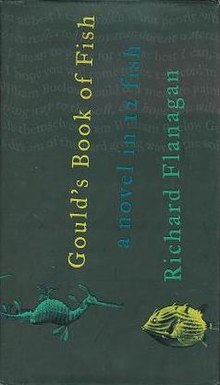 First edition | |
| Author | Richard Flanagan |
|---|---|
| Cover artist | William Buelow Gould (artwork), Alex Snellgrove (design) |
| Language | English |
| Publisher | Picador, Pan Macmillan, Australia |
Publication date | 2001 |
| Publication place | Australia |
| Media type | Print Hardback & Paperback |
| Pages | 404 pp |
| ISBN | 0-330-36303-4 |
| OCLC | 48471621 |
Gould's Book of Fish: A Novel in Twelve Fish is a 2001 novel by Tasmanian author Richard Flanagan. Gould's Book of Fish was Flanagan's third novel.